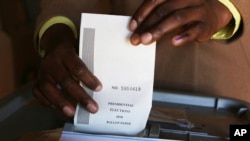Almost 72% of Zimbabweans want traditional leaders to stay out of politics and let people decide for themselves how to vote, according to the latest survey conducted by Afrobarometer.
In its findings of a survey involving 1,200 respondents in Zimbabwe, Afrobarometer said rural people should vote without being influenced by kraal heads, headmen and chiefs.
“While they are split in their assessments of traditional leaders’ impact on democracy, Zimbabweans are much more unified in their view that traditional leaders should stay out of politics and leave people to make their own decisions about how to vote (72%). Only one-fifth (19%) say traditional leaders have a better grasp of political issues than ordinary citizens and should give them advice about how to vote.”
The opinion that traditional leaders should stay out of politics is strong across all key demographic groups, including ZANU-PF supporters (71%).
“Surprisingly, rural residents are even more insistent on this point than their urban counterparts.”
The survey also shows that Zimbabweans believe that traditional leaders retain significant influence in local governance, in dispute resolution, in the allocation of land, and to a lesser degree in shaping how people in their communities vote.
“Few citizens want the influence of traditional leaders to increase, but even fewer want it to decrease. Zimbabweans hold mixed views on whether traditional leaders serve the interests of the people and on whether they strengthen or weaken democracy, but they generally trust these non-elected leaders, especially in rural areas.”
According to Afrobarometer, just as Zimbabweans hold mixed views of how much influence traditional leaders should exert, they are divided in their views of whose interests these unelected leaders serve.
A plurality (38%) say traditional leaders mostly look out for what is best for the people in their communities, but almost as many (31%) believe they mostly serve the interests of politicians and government officials.
About two in 10 see them as mostly looking out for their own personal interests. The view that traditional leaders mostly look out for what is best for the people in their communities is more prevalent among rural residents (51%) and supporters of the ZANU-PF (59%) than in towns and cities (18%) and among MDC-Chamisa adherents (32%).
“It is also the majority opinion among respondents with primary or no formal education (55%, vs. only 20% of those with post-secondary education). Masvingo is the only province where a majority (54%) of respondents say traditional leaders mostly serve their communities’ interests. In Harare, just one in five respondents (22%) agree.”
The functions of traditional leaders in Zimbabwe’s rural areas are outlined in the Constitution and the 1988 Traditional Leaders Act. They include promoting and upholding the cultural values of their communities, facilitating development, and administering communal lands. They are also charged with protecting the environment, resolving disputes in their communities, and exercising any other functions conferred or imposed on them by an act of Parliament.
The Constitution bars traditional leaders from being members of any political party, participating in partisan politics, and furthering the interests of any political party or cause.
Afrobarometer indicates that despite this constitutional provision, some traditional leaders in Zimbabwe have been accused of dabbling in politics, typically in support of the ruling ZANU-PF party.
“Critics say the party acquires allegiance through measures such as subsidized vehicle-purchase schemes and electrification of traditional leaders’ homes, and in exchange some traditional leaders openly support ZANU-PF and restrict mobilization by opposition political parties (Chigwata, 2016). In May 2018, in response to a complaint by an opposition leader, the High Court of Zimbabwe issued a ruling banning all traditional leaders from engaging in politics.”




